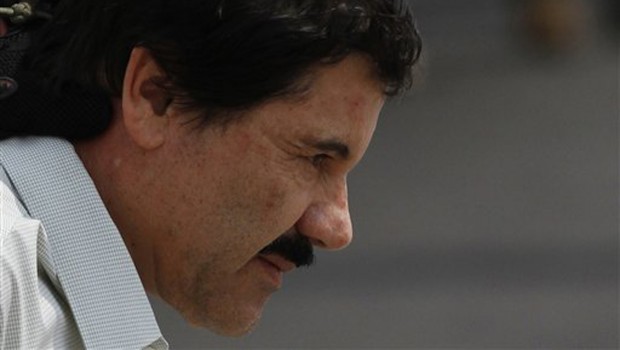The tall tale of justice
Martín Solares
English translation by Tanya Huntington
Over the past few days, we have watched an elaborate, deliberate, appalling story unfold on the vast majority of Mexico’s media and social networks. The lead character is Justice, but justice is nowhere to be found. The story begins with the arrest of “El Chapo” Guzmán on Friday, January 8, followed immediately by an exposé of his sentimental life, the messages he exchanged with a Mexican actress, even the implants that he apparently received. But locking up the leader of the Cartel of Sinaloa and exhibiting his peccadillos is not enough to prevent his network of businesses and complicities from remaining intact at home and abroad.
The best contemporary crime novels have shown us that the figure of justice is glaringly absent from public life in many countries. As the senior detectives explain to their newly arrived colleague in Natural Causes, James Oswald’s most emblematic novel, justice is a bedtime story told to children in order to make them behave.
As El Chapo’s story has shown us once again, the Mexican brand of justice does not seem overly concerned with finding and punishing the guilty once a crime has been detected, but rather in concealing, doling out and partially revealing the developing situation, always in calculated, well-timed doses that are frequently spun to control their effect. Remember the video montage that showed Florence Cassez interpreting her own arrest, or the one that portrayed the capture of the Abarcas, so well groomed despite the fact that in theory, they were taken by surprise. While the district attorneys of Mexico may be quick to get information, everything seems to indicate that they take their time in deciding when and where it is convenient to them to make it public, and to what extent.
There are two things that never fail those who constantly rewrite this story on behalf of the Mexican government: their capacity to censor certain violent facts in such a way that they fail to appear, or only modestly appear, in the press; and their capacity to create a spectacle out of criminal arrests, eluding their obligation to display the range of their businesses and tackle the issue in-depth. Mexico must be one of the few countries in which a single tree is supposed to conceal our vision of an entire forest. To believe that the arrest of a drug lord is “mission complete” is equivalent to accepting the fact that the function of our government is to create an incomplete, complacent representation of the rule of law, or that arresting one criminal is the equivalent of uprooting the gigantic tree of corruption.
The flimsy story of peace and stability that was circulated in Mexico by two presidential administrations of the National Action Party (PAN in Spanish) fell to pieces every time major groups of delinquents showed themselves in public. The same criminals who had made an effort to live in secret for decades were suddenly organizing marches, giving interviews, and leaving messages in which they demanded their right not to be part of the story, but to guide the course of national history. On the other hand, the tall tale or “new narrative” that the government is currently broadcasting concentrates on the exhibition of an arrest, as if that were enough to make the enormous crisis that we are suffering disappear. To put it euphemistically, in exchange for bread and circus, the table is set for Mexicans to be extorted twice over: selectively or randomly by full-time criminals, and relentlessly by those who govern us: those who, out of incompetence or complicity, have become the best possible allies of the wrongdoers. People are assaulted while commuting to work, gunned down on their way to school, deprived of savings or properties earned with enormous effort. A few months are sufficient for a criminal group to rule the inhabitants of a city through terror. The process is always the same: when the first murder occurs, people of good conscience conclude that the deceased must have had debts pending with the delinquents, that he thoroughly deserved his fate. But as these deaths multiply and acquaintances, friends, or relatives become part of the body count, mistrustfulness gives way to fear. By then, it is apparently too late for anyone to react, and people become accustomed to living in fear.
While the tall tale of justice continues to make the rounds, the reality of the situation in the failed states of our nation is sending an emergency signal: a warning of the disaster yet to come. What happens in Ciudad Juárez, in Michoacán, in Morelos, and in Tamaulipas over the next few years will become the definitive model for any Mexican city, neighborhood, or home. If we continue to tell the tall tale of justice, if we allow the delinquents to set the rules governing our existence, we will enter headlong into a new form of capitalism where we will no longer be dealing with wolves, but the worst predators imaginable.
Unfortunately, what any Mexican crime author writes down in his books is pure fiction. The real novel is the one we have to live in every day.
*Cover image: Joaquin “El Chapo” Guzman is escorted to a helicopter in handcuffs by Mexican navy marines at a navy hanger in Mexico City. (AP Photo/Marco Ugarte)
 Martín Solares is a Mexican writer, critic and editor who received the Efraín Huerta National Literary Award in 1998. He is the author of the novel The Black Minutes among other titles. Follow him on Twitter at @martinsolares.
Martín Solares is a Mexican writer, critic and editor who received the Efraín Huerta National Literary Award in 1998. He is the author of the novel The Black Minutes among other titles. Follow him on Twitter at @martinsolares.
Posted: January 27, 2016 at 11:38 pm










